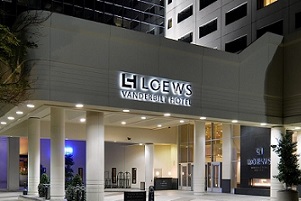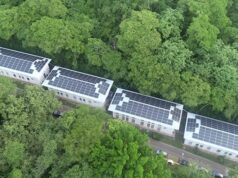 When it comes to implementing energy efficiency measures in hotels, the hospitality sector faces unique challenges such as overcoming the limitations between ownership and management and accessing capital for upgrades, all while complying with brand standards and meeting guest comfort expectations. Three Better Buildings partners, HEI Hotels & Resorts, Loews Hotels & Co., and Las Vegas Sands Corp., are successfully overcoming these barriers and achieving significant energy savings while making progress towards their Better Buildings Challenge commitment of reducing portfolio-wide energy use by 20 percent in a decade. The U.S. Department of Energy’s Better Buildings Challenge (BBC) is part of a broader Better Buildings Initiative aimed at accelerating the adoption of energy efficiency practices across our nation’s private and public buildings. BBC partners commit to a significant energy reduction goal and agree to share their solutions on the Better Buildings Solution Center so that others can replicate their best practices.
When it comes to implementing energy efficiency measures in hotels, the hospitality sector faces unique challenges such as overcoming the limitations between ownership and management and accessing capital for upgrades, all while complying with brand standards and meeting guest comfort expectations. Three Better Buildings partners, HEI Hotels & Resorts, Loews Hotels & Co., and Las Vegas Sands Corp., are successfully overcoming these barriers and achieving significant energy savings while making progress towards their Better Buildings Challenge commitment of reducing portfolio-wide energy use by 20 percent in a decade. The U.S. Department of Energy’s Better Buildings Challenge (BBC) is part of a broader Better Buildings Initiative aimed at accelerating the adoption of energy efficiency practices across our nation’s private and public buildings. BBC partners commit to a significant energy reduction goal and agree to share their solutions on the Better Buildings Solution Center so that others can replicate their best practices.
HEI Hotels & Resorts has achieved 1.9 percent annual improvement across their 10 million-square-feet portfolio using strategic low-cost operational improvements. Loews Hotels has achieved 13 percent energy savings since 2012 across their 24 luxury hotels, including the Loews Vanderbilt Hotel which has gone through a comprehensive building upgrade to create a more energy-efficient and comfortable hotel. Las Vegas Sands Corp., owner of The Venetian and The Palazzo, has achieved 17 percent portfolio-wide savings since 2011. These widely different hoteliers have come together to join the Better Buildings Challenge with a common interest in improving guest comfort and saving money on energy bills while working towards their corporate sustainability goals.
HEI Hotels & Resorts Implements Low- and No-Cost Energy Efficiency Upgrades
HEI Hotels & Resorts is a hospitality owner and operator of over 70 upscale and luxury hotels including well-known brands such as Hilton, Hyatt, Marriott, Starwood and Crowne Plaza. HEI identified unique opportunities to realize energy savings from operational changes that require minimal upfront costs, including a standard operating procedure for temperature set-points and a company-wide employee engagement campaign.
Although water and air temperature set-points for various equipment or spaces in a hotel are often specified by individual brands or by health regulations, HEI realized that certifying key set-points more precisely within these ranges, based on the operation of the equipment at a specific property, could yield energy and cost savings. HEI developed a standard operating procedure as part of its Energy Set-point program (ESP) that identifies a uniform process for establishing, maintaining and re-evaluating temperature settings for each property. Set-points provide detailed ranges for summer/winter settings in applicable areas and identify an “optimum setting” to be used during peak periods.
Each property determines the hotel’s specific water and temperature set-points including domestic hot and cold water (supply and return), chilled water supply and return, laundry, kitchen equipment and pool water temperature set-points, and occupied and unoccupied settings for guestrooms and banquet spaces. The ESP includes formalities for quality checking set-points during preventive maintenance and continually evaluating for optimal performance. Read more about HEI’s implementation process of the Energy Set-point program here.
HEI recognizes that staff play a big role in organizational change which led to the development of the Fab Four Energy Buddy program. The “Fab Four” is comprised of department heads from the four most energy intensive areas of the hotel (engineering, housekeeping, kitchen and banquets) who are responsible for identifying energy efficiency opportunities. A member from within each department is then called on as an Energy Buddy to carry out identified efficiency measures. In return, HEI incentivizes property performance by giving out awards to the teams who have achieved the highest savings. HEI Hotels & Resorts serves as a leading example of how hotel management operations can significantly contribute to energy and cost savings.
Loews Vanderbilt Hotel Uses Upgrades to Reduce Energy by 22 Percent

Loews Vanderbilt, located in downtown Nashville, is a 420,000-square-foot luxury hotel with over 350 guestrooms and 24,000 square feet of meeting space. Loews flagged the Vanderbilt Hotel for energy projects due to its significant savings potential and outdated facility equipment. Gearing up for implementation, Loews undertook a study on chiller re-sizing and partnered with their local utility to receive $125,000 in project funding assistance. In 2015, the Loews Vanderbilt team initiated a series of energy projects to achieve 22 percent energy savings. Loews upgraded the hotel’s central plant which included installing new chillers, upgrading the domestic water pump system, adding variable frequency drives on existing chilled water pumps, and replacing cooling tower water distribution media. Beyond energy savings, Loews also benefited from reduced cooling tower make-up water and spend on cooling tower chemicals with these upgrades. Outdated elevator hoist motors were replaced with new direct-drive motors that reduce energy consumption by 20 percent per elevator. Lighting upgrades throughout the hotel included replacing all public-area light fixtures with LEDs. Finally, Loews optimized the hotel’s building envelope by replacing the ballroom roofing which improved the hotel’s overall R-value by 20 percent. Loews continuously monitors equipment performance through their monthly Loews Score Card and schedules preventive maintenance as needed to ensure equipment is performing to manufacturer standards.
Like other hoteliers, Loews is always looking for ways to reduce operating costs while maintaining or improving guest comfort. Loews Vanderbilt is planning to install a thermostat control system that will allow the engineering team to centrally oversee and manage guestroom fan coil units. The new integrated system allows engineering staff to identify when rooms are vacant or occupied, allowing the engineering team to determine whether temperature setbacks can be implemented to allow for better temperature management across the hotel for guests.
Loews instills sustainability practices in its engineering staff and offers the Gold Wrench Award to engineers who have demonstrated a high-level commitment to monitoring energy use, engaging employees, developing energy management strategies, and other building management best practices. The award incentives employees and offers an avenue for friendly competition among peers who are continuously striving to be better and contributing to Loews’ corporate energy conservation goals.
Las Vegas Sands Attains Impressive Energy & Water Savings at Resorts
On a much larger scale, the Venetian and the Palazzo in Las Vegas underwent several energy and water efficient upgrades that have contributed to Sands’ 17 percent portfolio-wide energy savings to date. The Venetian, The Palazzo, and Sands Expo make up one of the world’s largest hotels under one roof, with over 7,000 guestrooms and 17 million square feet. The Las Vegas resorts prioritize an ultimate guest experience and have successfully demonstrated the ability to reduce energy and water consumption while maintaining (and improving) guest satisfaction.
The in-house Sustainability team at Las Vegas Sands manages the properties’ environmental performance by analyzing utility data to improve operations. The team manages energy and water conservation through the Eco Tracker platform, an internally-developed tool that helps them implement sustainability projects. Property-level sustainability teams are instrumental in developing solutions, encouraging action, and building awareness which has been demonstrated at their Las Vegas resorts.
In 2015, Sands renovated the 3,000 guestrooms at The Venetian Resort to include LED lighting, low-flow fixtures, and energy efficient appliances all while using LEED standard renovation materials. A similar renovation is underway at the Palazzo and collectively Sands is saving an estimated 8 million kWh and 30 million gallons of water annually.
Sands upgraded lighting and controls in the Sands Expo and Venetian Congress exhibit halls and optimized the resorts’ central plant with new hardware and software allowing Sands to save approximately 8 million kWh annually.
Water use directly affects energy savings and the Las Vegas resorts are significant water consumers with impressive amenities such as 12 swimming pools and spas across the entire campus. Sands tackled water-use reduction by installing a new nanofiltration system that converts unusable groundwater into recycled water for irrigation, cooling towers and exterior cleaning. Sands is also using a glass filtration media for all 12 swimming pools and spas which reduces backwash water demand by 70 percent and provides cleaner and healthier water for guests. The Venetian and The Palazzo resorts will save approximately 55 million gallons of water annually due to these upgrades.
Las Vegas Sands’ corporate sustainability standards are outlined in their ECO360 environmental strategy which ensures hotel operations are energy and resource conscious and provides Sustainable Development Standards for property remodels and renovations. The Venetian and The Palazzo resorts are a testament to Sands’ portfolio-wide energy conservation efforts and their commitment to finding new technologies and better ways to fine-tune hotel operations.







